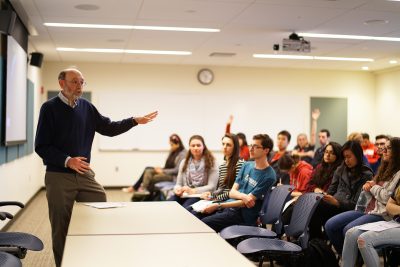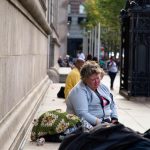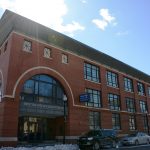
Nearly 50 students and faculty gathered at the Yawkey Center for Student Services Tuesday night for a discussion about how Donald Trump’s presidency will affect science in terms of education, climate, research and medicine.
The conversation, titled “Professor Perspectives: The Trump Administration and Science,” was hosted by the American Society of Biochemistry and Molecular Biology. Boston University physics professor Andrew Duffy and biology professor Edward Loechler spoke at the symposium.
Grace Ferri, the co-founder and president of BU’s ASBMB chapter, said the conversation provided a chance to stimulate discussion around a challenging topic and offered an opportunity for students to voice their concerns.
“We hope this panel will allow students to gain insight into the effect of politics on science and encourage students to voice their concerns,” Ferri said before the discussion. “Moreover, we hope students will leave from this panel better equipped to advocate for themselves in scientific pursuits.”
Each speaker in the panel spoke for approximately 45 minutes, followed by time for questions.
Duffy, the discussion’s first speaker, said scientists work based on hard numbers as opposed to the way in which the Trump administration looks at certain issues.
“No matter what we’re doing, we just look at the evidence, we weigh that evidence and we make decisions based on the evidence,” Duffy said. “We, as scientists, just assume that the folks down in Washington are going to think that way as well. I think that this election has really been a call to action and a wake-up call to all of us. We can’t just assume that people are going to think the same way we are and make laws and regulations based on that.”
The discussion was the second installment of “Professor Perspectives,” a monthly program that gives professors a chance to educate students about a range of important topics. Alyssa Zahoruiko, a graduate assistant in the College of Arts and Sciences Student Programs and Leadership office, said the scheduling and planning for these events are mostly prepared by the students themselves.
“The purpose of the ‘Professor Perspectives’ events is to have student academic groups collaborate with faculty members of their choice to discuss a topic that they are interested in learning about outside of the classroom,” Zahoruiko said. “The CAS Student Programs and Leadership office helps to advertise and support the event, but much of the planning is done by the actual student groups communicating with the presenters they have chosen.”
Several students and alumni at the discussion said they thought the conversation was interesting.
Grace Kirkpatrick, a CAS sophomore, said the discussion offered an alternative perspective regarding the way individuals view science.
“I don’t think I learned anything particularly new so to speak, but I do think it opened my eyes to how we do think about these issues,” Kirkpatrick said. “I think I learned that it’s really not a simple problem. There are so many different ways that you can try to fix it by talking to more people, looking at numbers, analyzing data and going online.”
Alexander Mojarrab, also a CAS sophomore, said he was disappointed that the panelists did not seem to have different opinion.
“I didn’t actually get very much from the presentation itself, but I was almost startled that the cliché was met in so far as we had a presentation where you have only people who agree with each other talking to people who agree with people who are talking,” Mojarrab said. “It’s not productive. It’s unfortunate that they couldn’t get someone with a dissenting point of view.”
Frank Wong, an alumnus who graduated from CAS in 2014, said he was pleased with the overall quality of the discussion.
“There were a lot of little facts here and there that I learned,” Wong said. “There were a lot of things that Professor Duffy mentioned that I didn’t know regarding a lot of legislations. That’s something you don’t typically hear about … I thought the speakers were both pretty great. They had a nice contrast from each other.”




